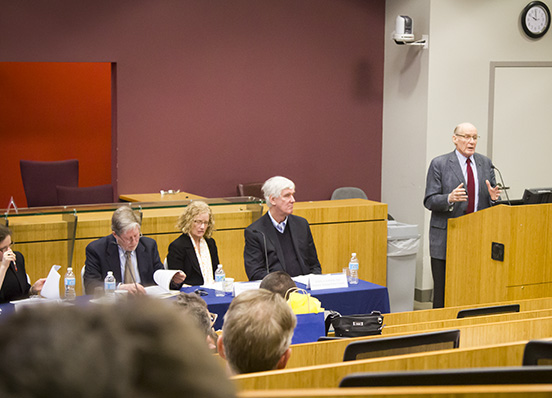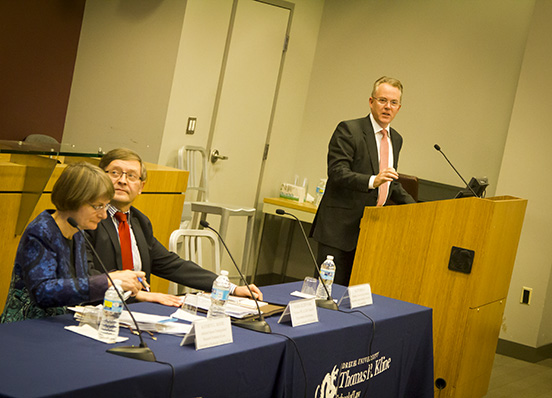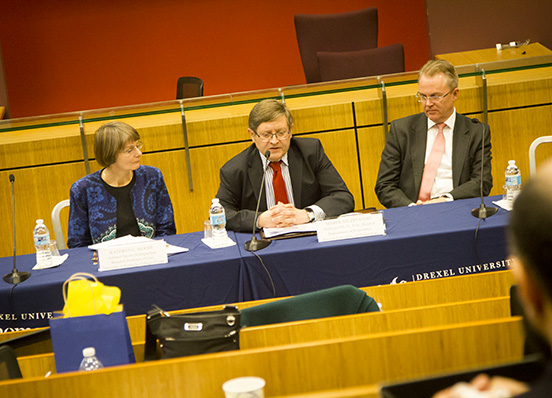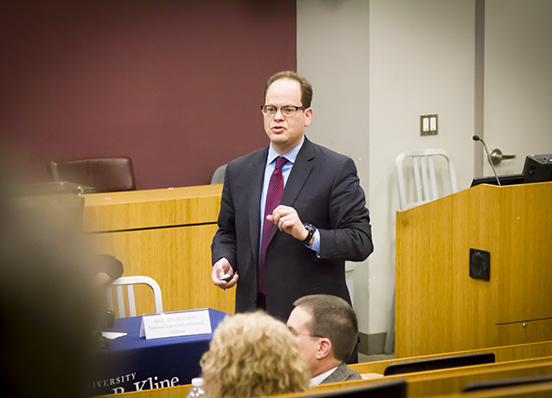The Kline School of Law hosted the 4th Annual Conference on Employee Benefits and Social Insurance on March 26 and 27 featuring presentations by nationally and internationally recognized experts.
Intellectual debate throughout the conference addressed the issue of a current and future retiree population with inadequate retirement funds. The same population, presenters agreed, lack the financial sophistication to assess the risks inherent in a U.S. retirement income and pension system that has become immensely complex.
Frank Cummings, former minority counsel for the U.S. Senate Committee on Labor and Human Resources, chief of staff to the late Sen. Jacob Javits of New York and a driving force behind the development of the Employee Retirement Income Security Act (ERISA), kicked off the conference on March 26 discussing some of the developmental aspects of ERISA and some suggestions on how policy experts can move forward.

John Turner, Director of the Pension Policy Center, an organization that provides pension policy analysis for the U.S. government, spoke about the negative financial impact many retirees suffer simply by not understanding or not being properly advised of the fees associated with choosing among a myriad of retirement options.
Other presenters, like Dana M. Muir, professor of Business Law at the University of Michigan's Ross School of Business, and Harvard Law Pensions & Capital Stewardship Project Director Larry W. Beeferman, addressed the need for new policies and regulations controlling the quality of disclosures financial advisors provide to retirees about the impact of retirement and pension related decisions.

Speakers Scott Donald of the Centre for Law, Markets and Regulation at UNSW Law Australia and Marek Szczepanski, Chair of Economic Sciences at Poznan University of Technology in Poland provided international perspectives on retirement policy. Donald discussed the effectiveness of a highly intertwined and interdependent Australian pension system that offers both inherent resilience and risk. Szczepanski, on the other hand, painted a picture of a Polish pension system not too dissimilar from that of the U.S., with low enrollment among lower income earning or younger populations.

Speakers Mareen Maloney of the National University of Ireland and Marquette University Law School Professor Paul Secunda approached the low pension enrollment problem from a behavioral economics perspective. Maloney presented her research on whether "inertia," or a lack of motivation to enroll, accounted for low pension enrollments while Secunda advocated for a more obligatory "choice architecture" enrollment system that encourages a particular set of pension enrollment decisions or, in some cases, makes enrollment mandatory.

Assistant Secretary of Labor of the Employee Benefits Security Administration (EBSA), Phyllis C. Borzi, discussed how her office has undertaken the enormous effort of modernizing the various forms and filings associated with financial and retirement plans and decisions. Doing so, Borzi said, will allow her office to make data driven policy decisions in the future instead of decisions based on assumptions.
Several interactive sessions rounded out the conference where both presenters and attendees collaborated on formulating new ideas and approaches to retirement income and pension policies through the lens of the scholarship of the many other scholars that contributed or presented at the conference.
Professor Norman P. Stein, a nationally recognized authority on pension law, employee benefits and tax law, not only participated in, but organized, the conference.